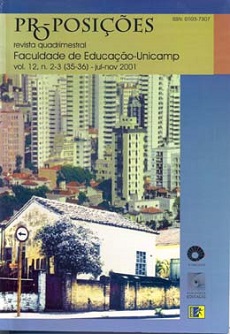Resumo
Neste artigo, a política de integração escolar das crianças com deficiência é apresentada inicialmente, frente à frente com outras políticas sociais desenvolvidas na França, ao menos no que diz respeito às denominações utilizadas. As noções de Integração social e cultural e de inserção colocam assim o problema de suas relações com a assimilação ou com a diferenciação. Em seguida, são examinadas as situações na Itália e na Grã-Bretanha, do ponto de vista das orientações gerais, dos procedimentos e denominações adotados em matéria de educação especial, desde o fim dos anos 70. As discussões em decurso sobre as noções de necessidade educacionais especiais e de educação inclusiva são assinaladas tendo a Grã-Bretanha, como exemplo. Finalmente, os obstáculos à expansão da integração escolar na França são analisados tendo por base investigações realizadas no nível da escola maternal, levantando questões como trabalho em equipe, parceria e cooperação.
Abstract:
In this article, the policy for school integration of children with disabilities is presented initially, face-to-face with other social policies developed in France, at least with regards to the terminology used. The notions of socio-cultural integration and insertion present, rhus, the problem of their relations the assimilation or the discrimination. Next, the situation in Britain and Italy are analyzed, in what refers to the general orientations, procedures and terminology that have been used in Special educational since the 70s. The discussions taking place about the notioos of Special educational needs and of inclusive education are highlighted and the example of Great Britain is presented.Finally, the obstacles to the spreading of school integration in France are analyzed on the basis of investigations carried out at the nursery school levei and issues such as group work, partnership and cooperation are raised.
Key-words: Integration. Disability. lnclusive education. Special educational needs. Partnership. Pedagogical Model
Referências
Armstrong D. Power and paternership in education: parents, children and special educational needs, Londonj New-York: Roudedge, 1995.
Armstrong F. Curricula, management and special and inclusive education, ln: Clough R, Managing inclusive education from policy to experience, London: Paul Chapman, p. 48-63, 1998.
Assistance Éducative Et Recherches. lntégration dujeune enfant handicapé en crecheet en maternelle, Paris: CTNERHI, 1981 Barton L. Inclusive Education: romantic, subversive or realistic lnternational JournaloflnclusiveEducation, vol. 1, n23, p. 231-242,1997.
Belmont B., Vérillon. A. Intégration scolaire d'enfants handicapés à l'école, maternelle: partenariat entre enseignantsdel'école ordinaire et professionnels spécialisés,Revuefrançaisedepédagogie,n!!119, p. 15-26, 1997.
Bourdieu P. (ed.) La misere du monde, Paris: Seuil, 1993.
Castel R. Les métamorphoses de Ia question sociale. Une chronique du salariat, Paris: Fayard, 1995.
Clough P. Managing Inclusive Education: From Policy to Experience, London: Paul Chapman, 1998.
De Anna L. L'intégration scolaire des enfants handicapés en Italie, Handicaps et Inadaptations, Lescahiers du CTNERHI, n272, p. 43-57, 1996.
_' Pedagogiaspeciale,Guerini, Milan, 1998.
Dubet F. Martucelli D. Dans quelle société vivons-nous? Paris, Seuil, 1998.
Haut Conseil à L'lntégration Pour un modele français d'intégration. Premier rapport annuel, Paris, La documentation française, 1991.
Langouet G. Observatoire de I'enfance en France,L'enfance handicapée en France, Paris, Hachette. ed. 1999.
Manço A. Intégration et identités. Stratégies etpositions desjeunes issusde l'immigration, Paris- Bruxelles, De Boeck Université, 1999.
Mege-Courteix M.C., Les aidesspécialiséesau bénéficedes éleves. Une mission de service public, Paris ESF, 1999.
OCDE, L'intégration scolaire des éleves à besoinsparticuliers, Paris, 1995.
Paugam S. L'exclusion, l'état des savoirs, Paris, La Découverte, ed. 1996.
Plaisance É., L'enfant, Ia maternelle, Ia société, Paris, PUF, 1986. Rapport sur l'acces à l'enseignementdesenfantset adolescentshandicapéstomes I et 11(annexes),ministere de l'Empfoi et de Ia Solidarité, ministerede l'Education nationale, 1999.
RavaudJ. F. La scolarisation des enfants handicapés, In: A. L. Triomphe, Lespersonnes handicapéesen France:Donnéessociales,Paris,CTNERHI, 1995.
Schnapper D. Ia communauté descitoyens.Sur l'idéemowne de nation, Paris, Gallimard, 1994.
Schneider C. L 'intégration scolaire: à Ia recherche du tissu social, mémoire de maítrise en scimces de l'éducation, Université René Descartes-Paris V. 1999.
Thouroude L. La tolérance pédagogique à l'école maternelle, Revue française de pédagogie, n2119, p. 39-46, 1997a.
Thouroude L., L'intégration d'enfants trisomiques 21 à l'école maternelle. Facteurs d'échec et de réussite liés aux conceptions pédagogiques de l'enseignant, Handicaps et inadaptations. Les cahiers du CTNERHI nl!74, p. 49-65. 1997b.
Tomlinson S. Special educational needs: the implementation of Education Act 1981, Journal ofEducation Policy, voI. 3, nl! 1, p. 51-58,1988.
Vislie L. Integration policies, schools reforms and the organisation of schooling for handcapped pupils in Western Societies, In: Clark, Dyson, Millward (ed), Towards inclusive schools?London, Oavid Fulton, p. 42-53, 1995.
A Proposições utiliza a licença do Creative Commons (CC), preservando assim, a integridade dos artigos em ambiente de acesso aberto.

